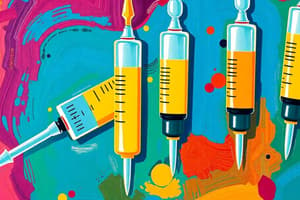Podcast
Questions and Answers
What is the primary goal of diabetes management?
What is the primary goal of diabetes management?
- To exercise for at least 3 hours daily
- To lose weight quickly
- To maintain blood glucose levels as close to normal as possible (correct)
- To eliminate all sugar intake
What is a recommended dietary change for diabetes management?
What is a recommended dietary change for diabetes management?
- Avoid consuming omega-3 fatty acids
- Increase fiber and omega-3 fatty acid intake (correct)
- Drink more sugary drinks
- Increase sugar intake
How often should strength-training exercises be incorporated into a diabetes management plan?
How often should strength-training exercises be incorporated into a diabetes management plan?
- At least twice a week (correct)
- Only on Sundays
- Daily
- At least three times a week
What is the ideal body mass index (BMI) range for diabetes management?
What is the ideal body mass index (BMI) range for diabetes management?
What is the purpose of HbA1c testing in diabetes management?
What is the purpose of HbA1c testing in diabetes management?
What is the most commonly used first-line medication for type 2 diabetes?
What is the most commonly used first-line medication for type 2 diabetes?
Flashcards are hidden until you start studying
Study Notes
Diabetes Management Overview
- Diabetes management involves a combination of lifestyle changes, medication, and monitoring to control blood sugar levels and prevent complications.
- The goal of diabetes management is to maintain blood glucose levels as close to normal as possible.
Lifestyle Changes
- Dietary Changes:
- Eat a balanced diet that is low in sugar, salt, and saturated fat.
- Increase fiber and omega-3 fatty acid intake.
- Drink plenty of water and limit sugary drinks.
- Physical Activity:
- Engage in at least 150 minutes of moderate-intensity aerobic exercise per week.
- Incorporate strength-training exercises at least twice a week.
- Weight Management:
- Maintain a healthy weight to reduce insulin resistance.
- Aim for a body mass index (BMI) between 18.5 and 24.9.
Medication
- Oral Medications:
- Metformin is commonly used as a first-line medication for type 2 diabetes.
- Other medications include sulfonylureas, meglitinides, and thiazolidinediones.
- Insulin Therapy:
- Insulin is used to treat type 1 diabetes and some cases of type 2 diabetes.
- Types of insulin include rapid-acting, short-acting, intermediate-acting, and long-acting.
Monitoring
- Blood Glucose Monitoring:
- Check blood glucose levels regularly to track progress and adjust treatment plans.
- Use a glucometer to measure blood glucose levels.
- HbA1c Testing:
- Measure average blood glucose levels over the past 2-3 months.
- Goal HbA1c level is <7% for most people with diabetes.
Complications and Prevention
- Acute Complications:
- Hypoglycemia (low blood sugar) and hyperglycemia (high blood sugar).
- Diabetic ketoacidosis (DKA) and hyperosmolar hyperglycemic nonketotic syndrome (HHNS).
- Chronic Complications:
- Microvascular complications: nephropathy, retinopathy, and neuropathy.
- Macrovascular complications: cardiovascular disease, stroke, and peripheral artery disease.
- Prevention Strategies:
- Regular health check-ups and screenings.
- Foot care and regular eye exams.
- Manage blood pressure and cholesterol levels.
Diabetes Management Overview
- Diabetes management aims to control blood sugar levels and prevent complications by combining lifestyle changes, medication, and monitoring.
Lifestyle Changes
- A balanced diet is crucial, with a focus on:
- Low sugar, salt, and saturated fat intake
- High fiber and omega-3 fatty acid intake
- Adequate water consumption and limited sugary drinks
- Engage in regular physical activity, including:
- At least 150 minutes of moderate-intensity aerobic exercise per week
- Strength-training exercises at least twice a week
- Maintain a healthy weight to reduce insulin resistance, with a:
- Body mass index (BMI) between 18.5 and 24.9
Medication
- Oral medications are used to treat type 2 diabetes, including:
- Metformin as a first-line medication
- Other medications like sulfonylureas, meglitinides, and thiazolidinediones
- Insulin therapy is used to treat:
- Type 1 diabetes
- Some cases of type 2 diabetes
- Insulin types include:
- Rapid-acting
- Short-acting
- Intermediate-acting
- Long-acting
Monitoring
- Blood glucose monitoring is essential to:
- Track progress and adjust treatment plans
- Use a glucometer to measure blood glucose levels regularly
- HbA1c testing measures average blood glucose levels over the past 2-3 months, with a goal of:
- Less than 7% for most people with diabetes
Studying That Suits You
Use AI to generate personalized quizzes and flashcards to suit your learning preferences.



